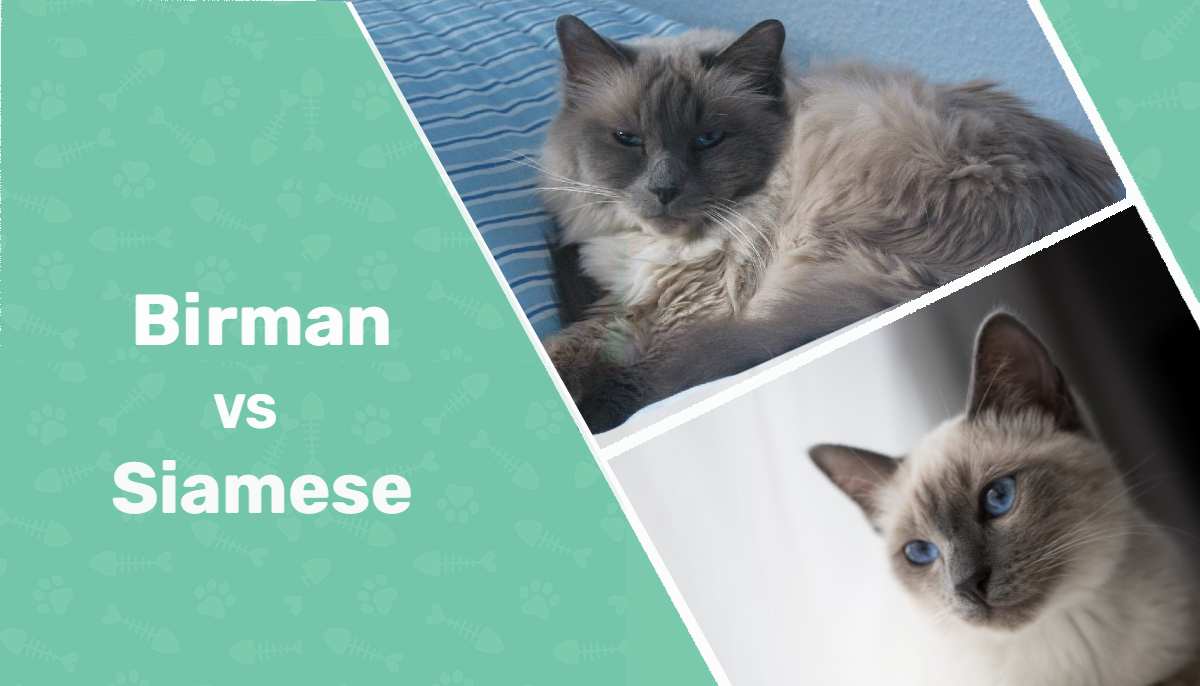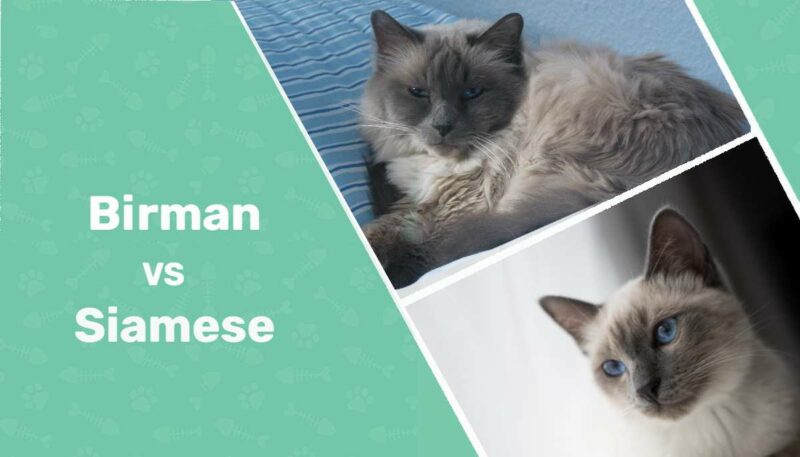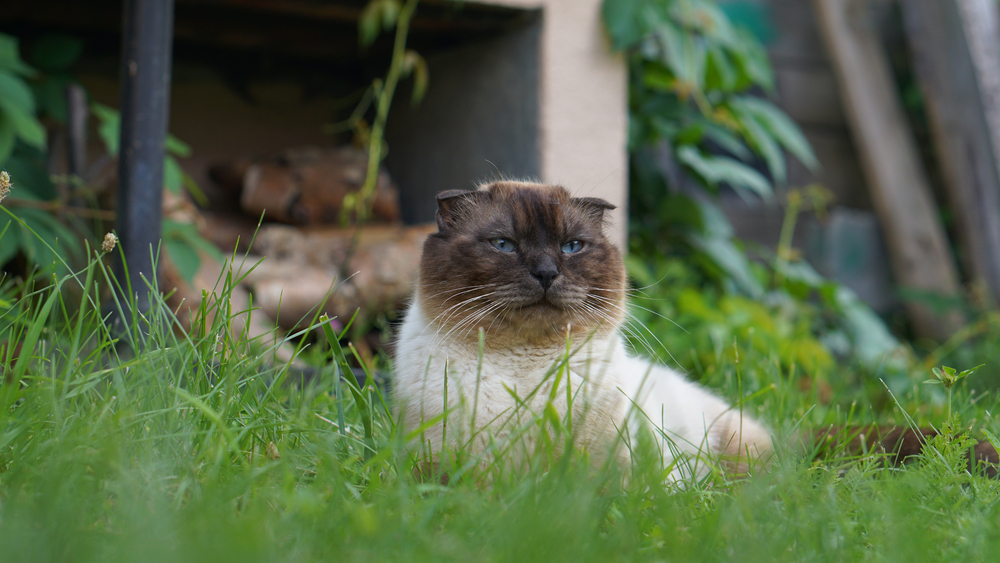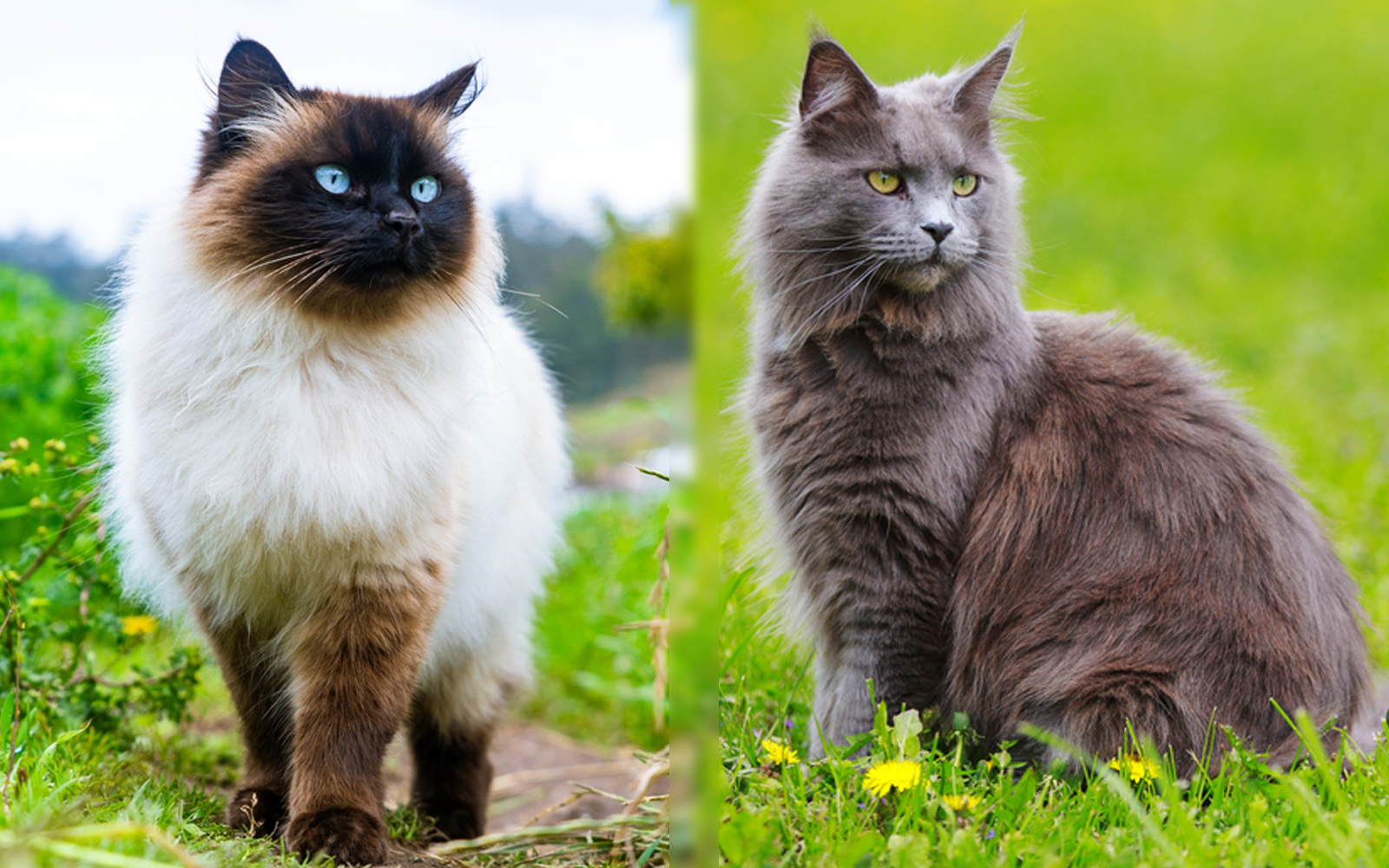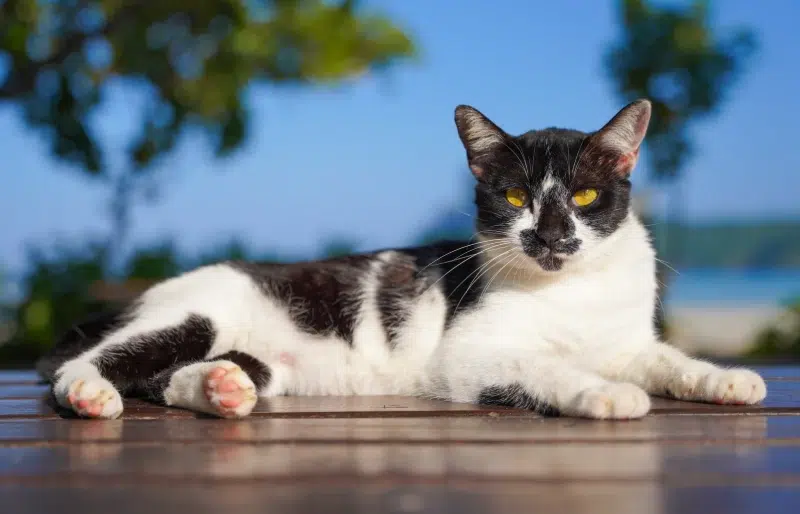There is something so elegant and beautiful about a faded cream to gray or brown shade on cat coats. On top of their coats having gorgeous shades of soft earth tones, both Birman and Siamese cats have stunning blue eyes.
In fact, Birman and Siamese cats look so similar they are often mistaken for one another. However, Birmans are a much rarer breed. Once you finish this article, you will know the difference between these two breeds, which may help you decide which is right for you.
Visual Differences
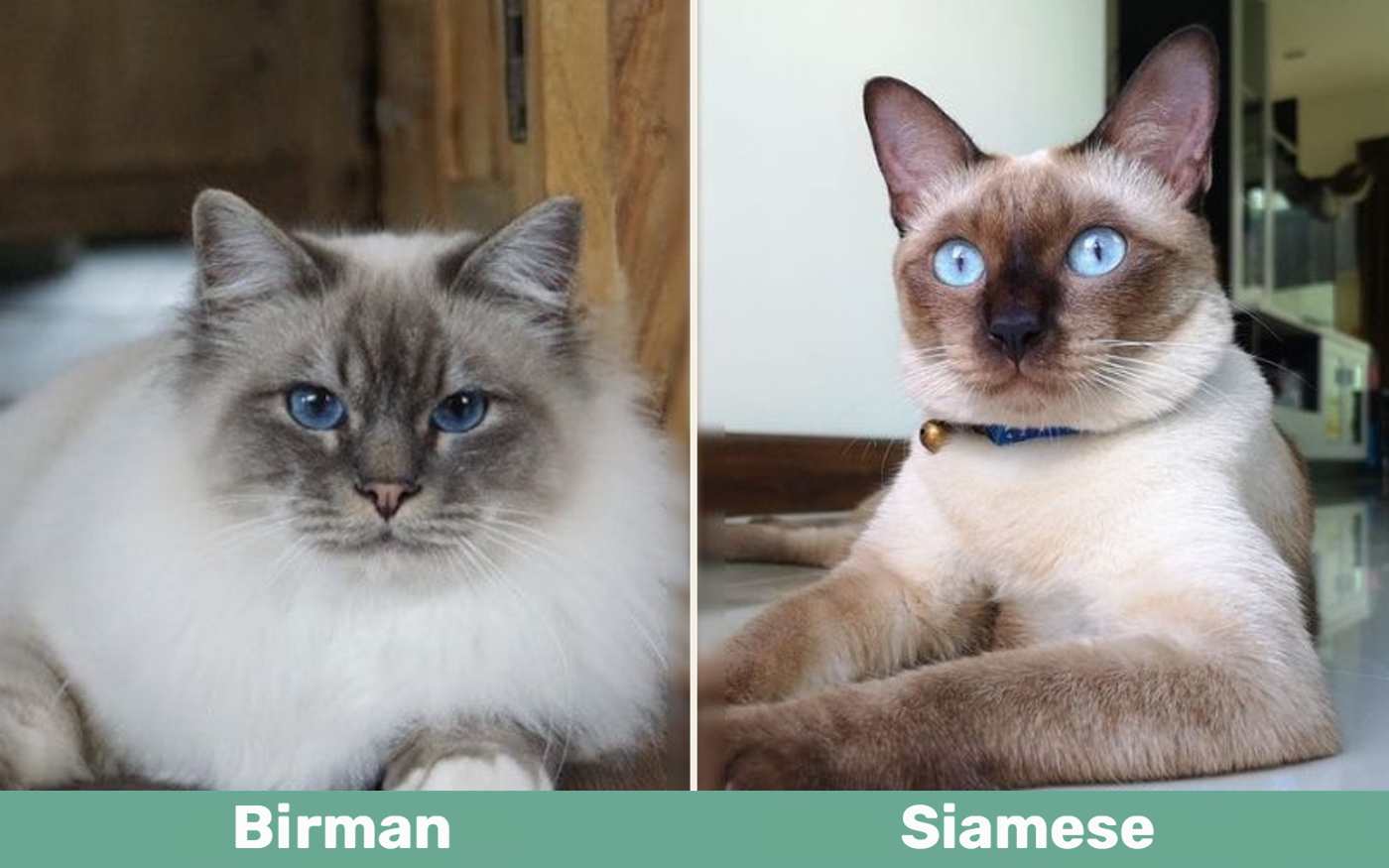
At a Glance
- Average height (adult): 8–10 inches
- Average weight (adult): 6–12 pounds
- Lifespan: 9–13 years
- Exercise: 15 minutes per day
- Grooming needs: Moderate
- Family-friendly: Yes
- Other pet-friendly: Often
- Temperament: Agreeable
- Average height (adult): 8–15 inches
- Average weight (adult): 10–14 pounds
- Lifespan: 10–13 years
- Exercise: 15 minutes per day
- Grooming needs: Easy
- Family-friendly: Yes
- Other pet-friendly: Often
- Temperament: Intelligent, sassy, difficult to convince

Birman Cat Overview
The Birman is also known as the Sacred Cat of Burma, meaning this breed has a special spiritual significance in its native land. It’s speculated that this breed descends from royal palace cats. They still show their royalty with their elegance and grace.
While visually similar, they are drastically different from their Siamese relatives.
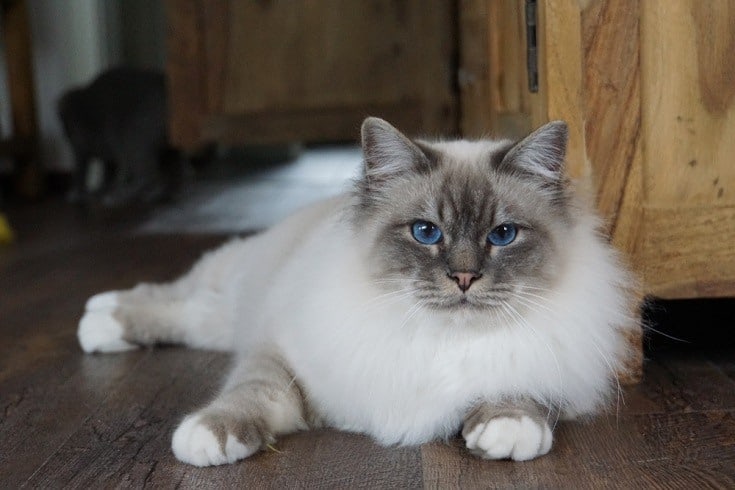
Personality/Character
If you are looking for a wonderfully loving family companion, you probably could not pick a better breed. These cats are incredibly friendly and affectionate. Because they are so good-natured, they make excellent pets for children and adults of all ages.
They also get along with other pets, which makes them compatible with even more lifestyles. Since they are so gentle, they tend to be patient with more hyper dogs or extra playful cats. But they might march to the beat of their own drum, politely dismissing play when they’ve had too much.
Because of their moderate activity level, they even work well in apartments and smaller living spaces. They feel just fine curling up on the couch for a lap nap or demanding rubs from their humans. But even though they love the interaction, they aren’t needy or overbearing either.
A Birman does not need tons of mental stimulation every day, but they are highly dependent on their people. These cats love being very social, so they work best in households in which they get lots of attention from their humans and even homes with other critters in them.
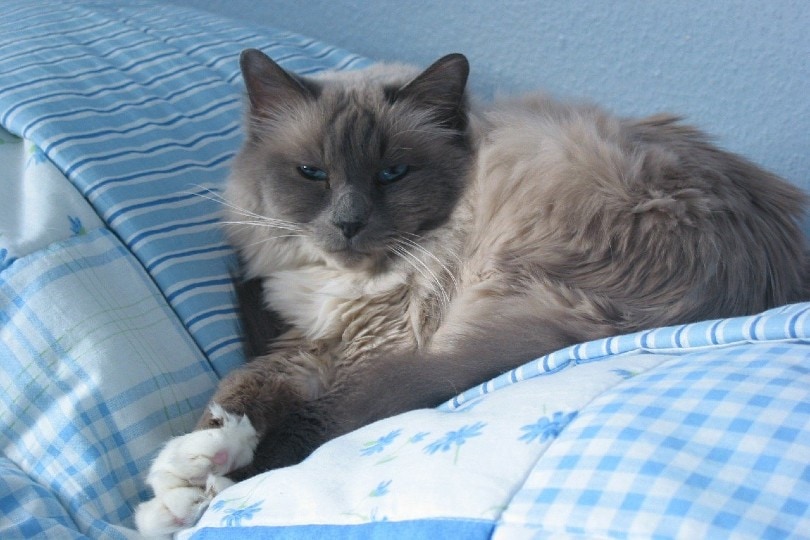
Physical Characteristics
This breed has a distinctive cream and brown coat with distinctive white mittens. Against their dark masks, they have penetrating blue eyes. Looking remarkably like the Siamese, the Birman instead has long hair. But don’t let the thick coat fool you—it’s not a problematic fur texture to maintain.
Birmans have the following coat colors in colorpoint markings:
- Seal
- Blue
- Lilac
- Chocolate
- Red
- Cream
- Tortie
While they resemble their Siamese cousins in eye and coat color, they tend to be bulkier and heavier than their sleek, lean counterparts. As adults, males weigh roughly 10 to 12 pounds while females weigh 6 to 10 pounds.
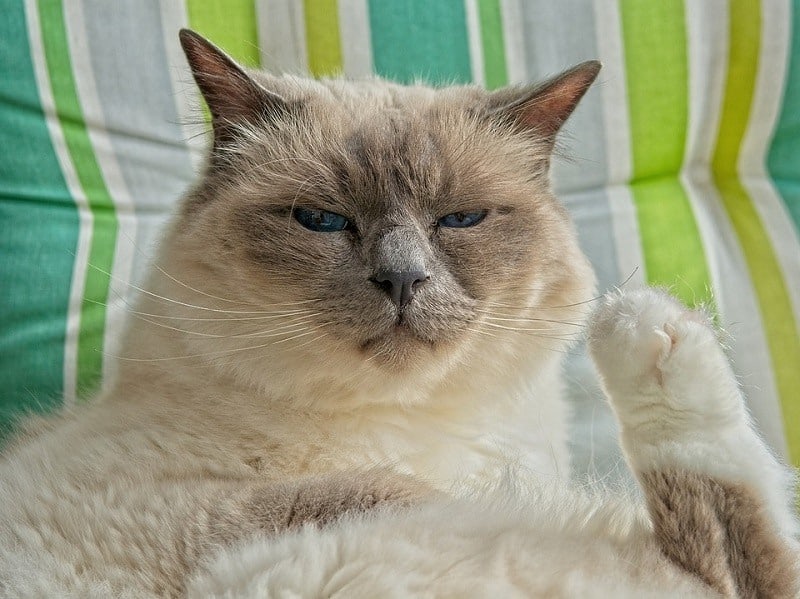
Exercise
By nature, Birmans have a relatively relaxed temperament. They don’t require a ton of daily activity, but they will be very energetic as most kittens are. As they age, especially after being spayed or neutered, they slow down quite a bit.
If you’re looking for a lap cat, this is definitely the one for you. However, to stay happy and healthy, the Birman needs at least 15 minutes of exercise per day. And we don’t think that is a lot.
Most cats take care of this on their own. Others require a little convincing. Just take a few moments each day to get your kitty’s heart rate up so they can burn some extra calories.
Remember that even though Birman cats don’t thrive on exercise as much, they still need their fair share of toys and scratching surfaces.
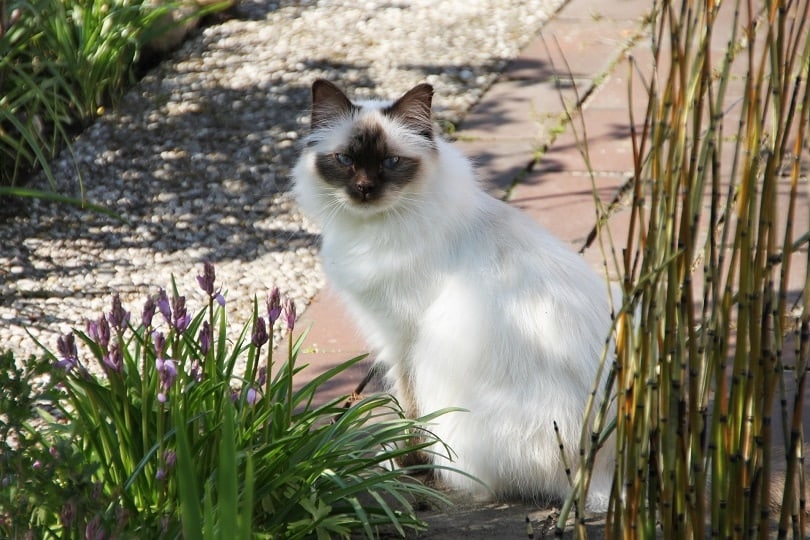
Grooming
Even though Birmans have beautiful, long fur, they actually require minimal maintenance. Professional groomers, these cats make sure to take care of their coats. Plus, it’s very light and fluffy and not as prone to matting as some other long-haired breeds.
However, you should still regularly comb your Birman to remove debris and tangles. Being so affectionate, your kitty will likely delight in brushing sessions—looking forward to them even.
Health
Sometimes certain cat breeds can really have a list of different disorders or diseases they’re prone to. While many cats are incredibly durable and resilient, having nine lives and all, even a cat of a royal bloodline can have trouble sometimes.
A Birman might have a higher risk for the following health issues:
- Obesity: Your Birman will love to eat. If your cat is obese, it can increase the likelihood of even more significant health problems—like diabetes. Especially after spaying or neutering, you have to check the pounds accumulated.
- Dental disease: As your Birman ages, they might have a higher risk for dental issues. To prevent impending matters, make sure to keep your feline’s mouth clean and plaque-free by regularly brushing. This is especially important if your cat is on a wet food diet.
- Arterial thromboembolism: While rare, this condition can affect this breed, causing devastating outcomes to the heart.
- Hemophilia: This condition is an inherited bleeding disorder that can make clotting difficult.
- Cataracts: Cataracts can come on with age and cause damage to vision, inflaming the eye.
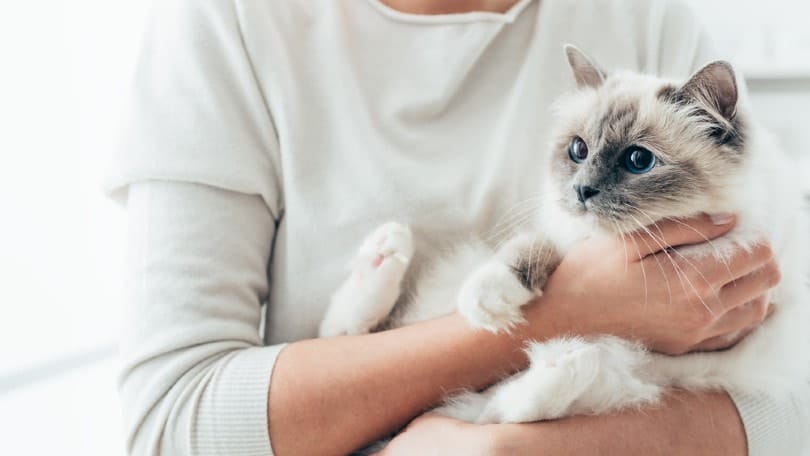
Suitable for:
Birmans are well-suited for virtually any home environment. They are very affectionate love bugs that do amazingly well alongside children, seniors, and other pets. However, we don’t recommend this breed for outdoor living.

Siamese Cat Overview
Stunning, intelligent, and maybe a tad bossy sometimes, Siamese cats have to be one of the most popular cat breeds in existence—and for a good reason. Siamese cats have a lot going for them—looks, personality, the works!
But this breed differs from a Birman in both physical makeup and personality.
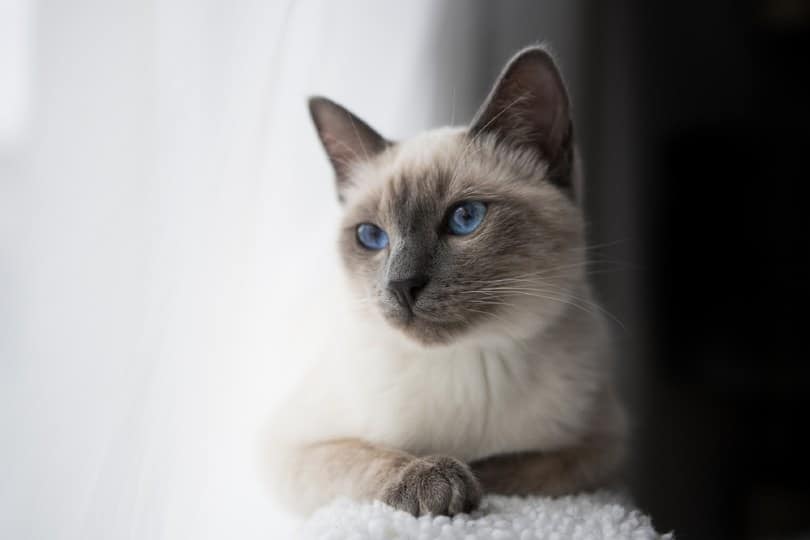
Personality/Character
Siamese cats have quite a reputation for having a mind of their own. They are quite independent, adventurous, and maybe a little nosy sometimes. It is one of the oldest and most recognizable cat breeds, notorious for their spitfire attitudes and interactive vocalization.
You might find them following you around screaming at you for more food or because they’re trying to communicate something important—they are classically chatty Kathys. You will enjoy long talks with your cat about the empty food bowl or the fact that you aren’t being fun enough.
Siamese cats are quite comical and outgoing. While they might not necessarily want physical affection from strangers, they aren’t afraid to come to check out newcomers to get more information.
Siamese cats can be a little demanding regarding attention or desires. If they want to play, they might demand to play. If they want a rub down, you better be ready to comply. But you will get a kick out of their antics.
This breed can be compatible with kids and other pets. However, they can be a little headstrong—their way or the highway. They don’t usually have a problem communicating when they’ve had enough.
Because of their vocalization, need for physical activity, and higher maintenance tendencies, these cats might not be a good match for seniors or people living in small spaces.
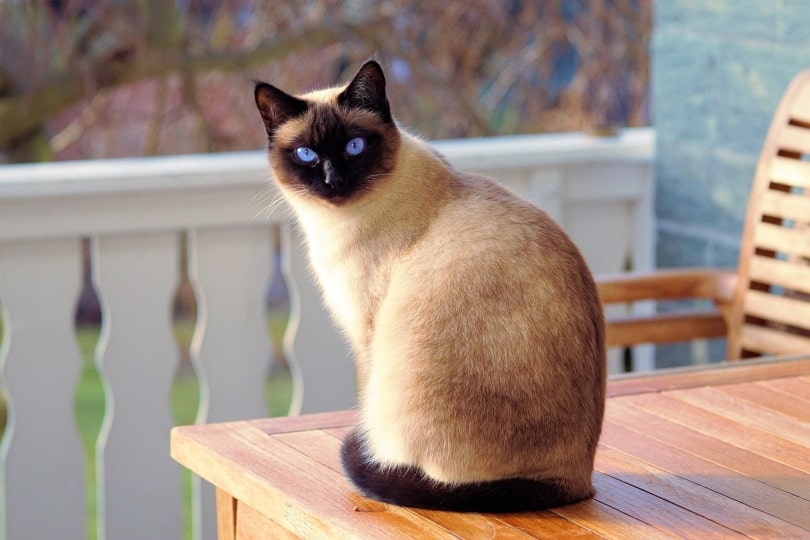
Physical Characteristics
The Siamese is actually a taller breed of cat than the Birman, with more slender bodies. So, they tend to be lighter and highly flexible. Because they are highly athletic and able-bodied, they make excellent hunters.
Siamese cats have a classically silver-gray coat. However, there are other colors to mention as well. While less common, you can find certain pure breeds in other variations as breeders try their hand at combining different genetics.
Siamese colors include:
- Silver-gray
- Orange
- Brown
- Cream
- Blue
- Lilac
But they most certainly always have the classic sapphire blue eyes.
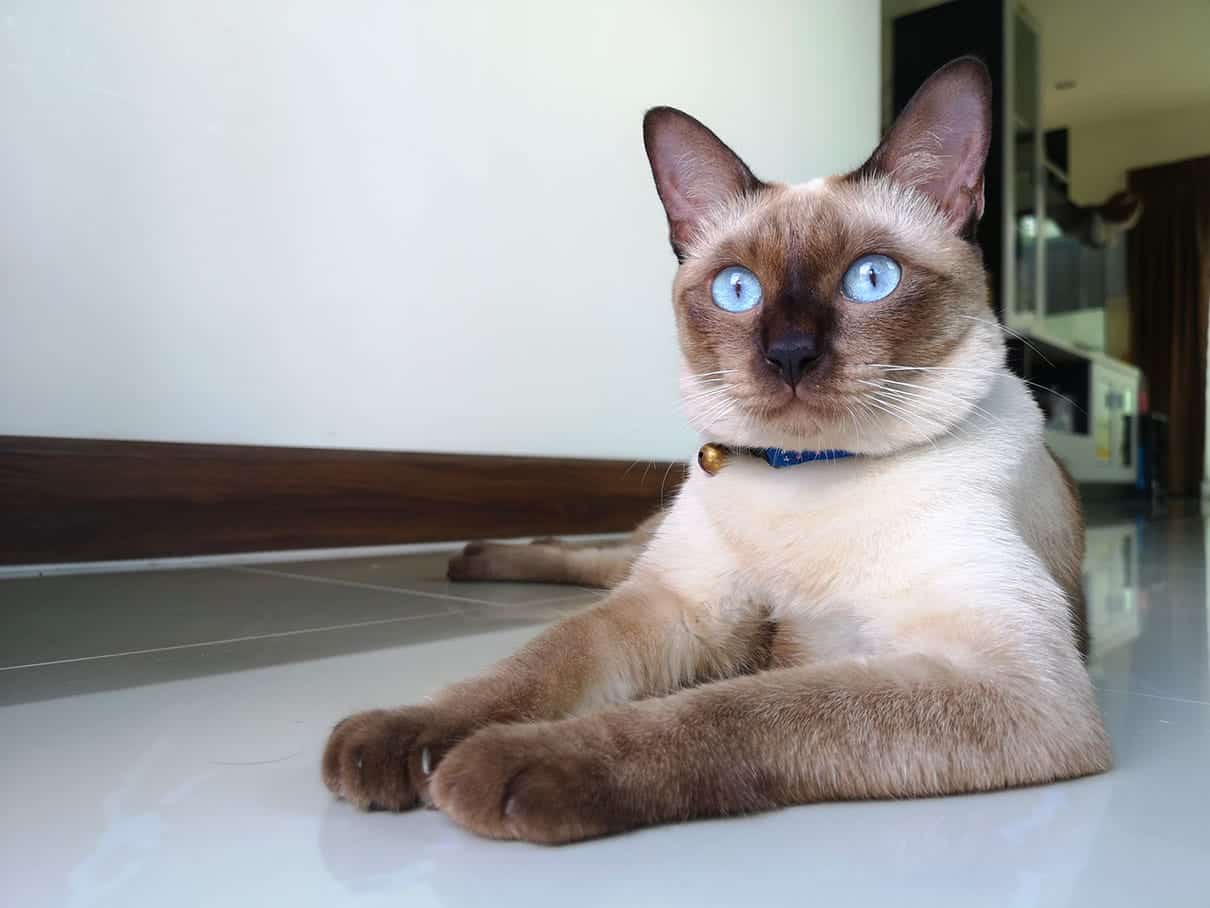
Exercise
The Siamese are usually very active on their own accord. So, even as adults, you probably will have no issue making sure they get the proper amount of exercise.
Like any other cat, they need at least 15 minutes of exercise per day. However, they will likely want more fun time because of their sense of adventure.
These cats benefit greatly from having lots of interactive and self-play activities. They tend to have a decent prey drive, meaning they need to chase, pounce, and stalk.
Siamese cats should have a wide list of toys, including cat scratching posts, stuffed toys, and battery-operated lights or movement.
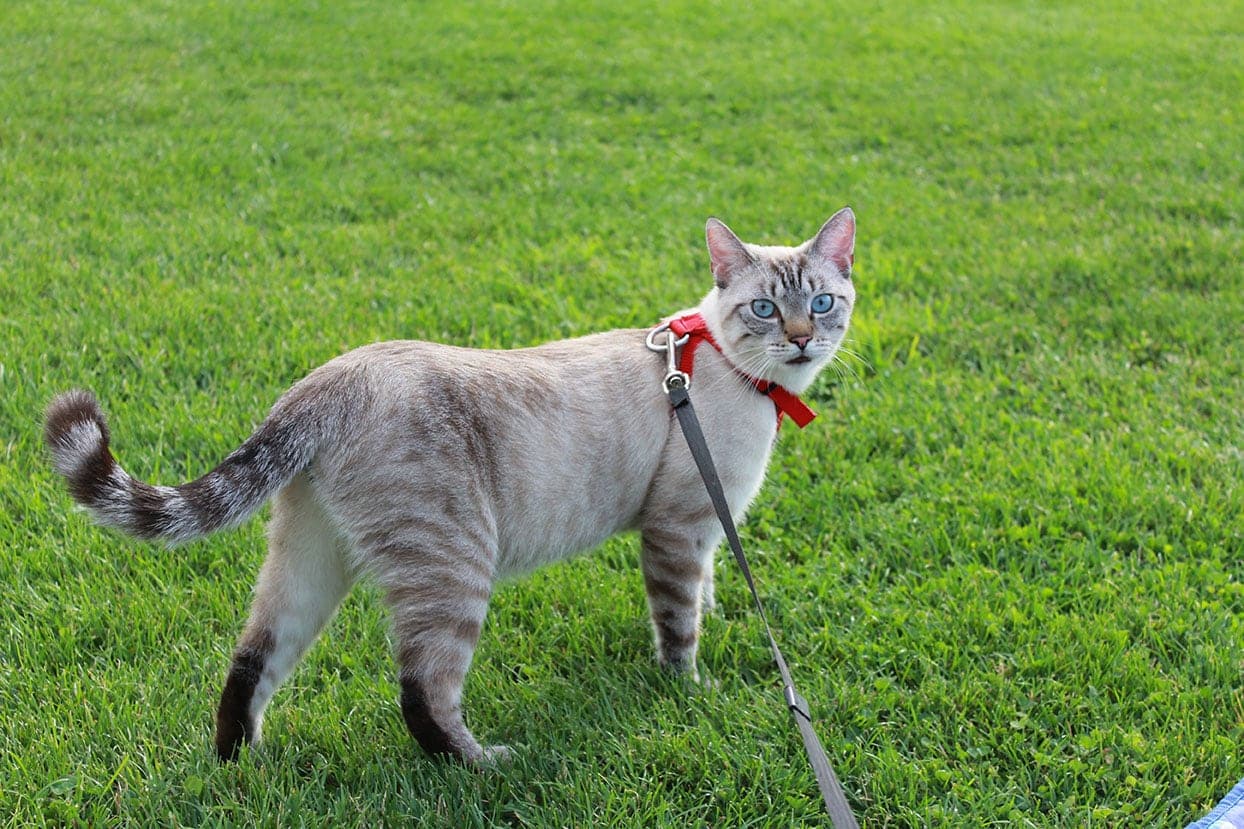
Grooming
If you have an allergy sufferer in your house, these cats might be a perfect fit. While no animal is ever 100% hypoallergenic, they’re as close as you’re going to get.
Siamese cats are pretty easy to maintain from a grooming perspective. They do most of the hard work for you, bathing themselves as needed.
To remove debris and keep the fur in top-notch shape, you can bathe these cats roughly every 6 weeks. Since they can have issues with clawing, you might want to pick up some nail covers, too.
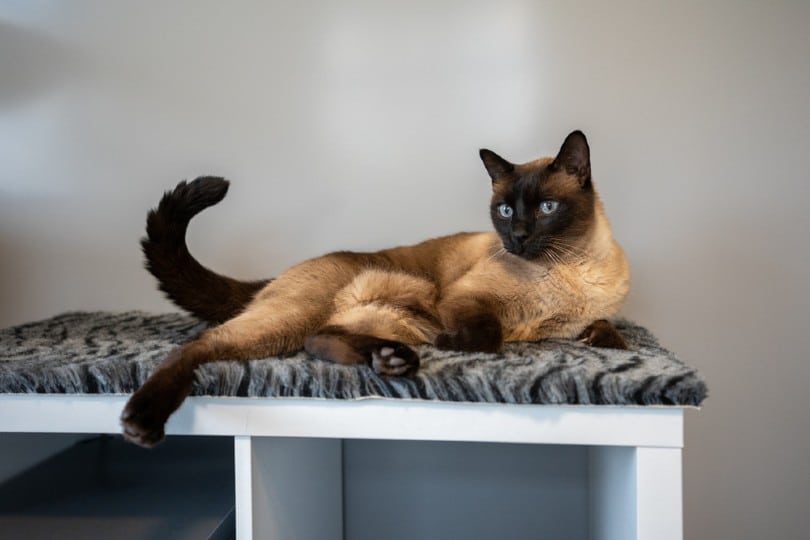
Health
Siamese cats are usually very healthy specimens. However, there are specific issues the breed might face.
Some issues that might affect Siamese cats more often include:
- Progressive retinal atrophy: Siamese cats might have an issue with their vision eventually. This eye condition causes the degeneration of the eye that affects photoreceptor cells.
- Niemann-Pick disease: Luckily, if your Siamese has this issue, you should know relatively early. Niemann-Pick disease shows up by 3 months of age and affects balance coordination, causing splayed legs.
- Hip dysplasia: Siamese are long, large cats. They might develop hip dysplasia caused by degeneration of the cartilage between hip joints, causing painful rubbing.
- Asthma: For some reason, asthma is a pretty common issue found in the breed. Siamese cats prone to asthma usually have coughing as a main symptom.
- Mediastinal lymphoma: Mediastinal lymphoma is a type of cancer that affects the cells of the cat’s immune system. Siamese cats are prone to this, along with other intestinal tumors. To reduce the risks and prepare for anything, make sure you take your kitty to routine vet appointments so you can get ahead of any potential problem.
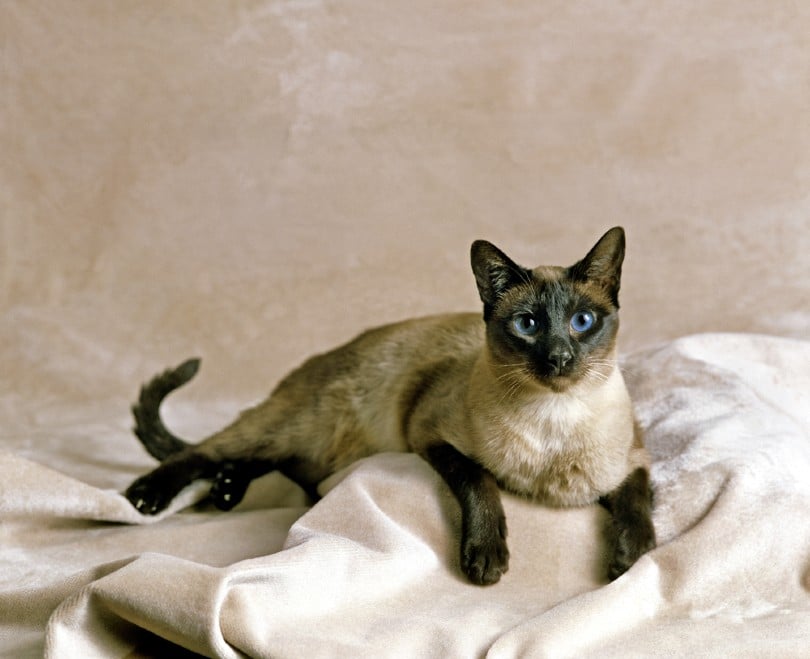
Suitable for:
Because of their spunk and playfulness, Siamese cats do best in a home where they will get lots of interaction. They can make awesome playmates for children and other pets. But because they might play a little rougher than some other breeds, we don’t recommend them for toddlers.

Choosing Between the Birman and Siamese
Birman and Siamese differ greatly in personality. So, here’s a way you can choose:
Home Life
- Homes with other pets
- Homes with children
- Rentals, small living spaces
- Homes with lots of room to explore
- Humans who will play with them
- Homes with stimulation
Personality Traits
- Gentle
- Relaxed
- Friendly
- Interactive
- Talkative
- Independent
Activity Levels
- May require motivation for play
- Tends to be gentle even while playing
- Might become lazy with age
- Usually always ready to play
- Requires self-play and interactive toys
- Usually make fantastic hunters
Grooming Needs
- Requires regular brushing
- Doesn’t shed frequently
- Easy to maintain
- Hypoallergenic cats less likely to trigger allergies
- Require very little coat maintenance
- Low shedding
Health & Longevity
- Weight management is crucial
- They have a short list of health issues
- They are very durable and sturdy
- These cats need mental and physical stimulation
- There are few health issues, but some can be serious
- These cats have a relatively long lifespan
Which Breed Is Right for You?
While these cats are very similar in looks, they differ quite a lot in other ways. Birmans enjoy a more relaxed approach to life, while Siamese prefer to live to the fullest. They each have beautiful attributes that make the breed stand out from the crowd.
If you plan on buying or adopting either breed, now you can pinpoint what to expect. Either breed would make a charming addition to the right home. You surely won’t be disappointed by the companionship on either account.
Featured Images: Top: Birman Cat: casion, Pixabay | Buttom: Siamese Cat: Lucie K, Shutterstock

